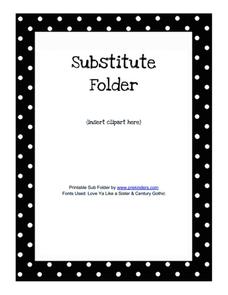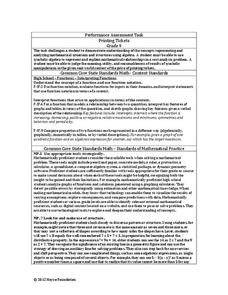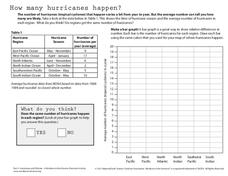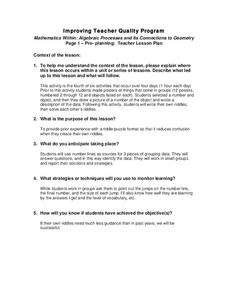Inside Mathematics
Squares and Circles
It's all about lines when going around. Pupils graph the relationship between the length of a side of a square and its perimeter. Class members explain the origin in context of the side length and perimeter. They compare the graph to the...
Massachusetts Institute of Technology
Nuclear Synthesis
Start this lesson with a bang! The eighth in a 13-part series of lessons explains the origin of elements beginning with the Big Bang Theory. The reading describes the formation of elements hydrogen through uranium.
PreKinders
Sub Folder
Erase the stress and anxiety of calling in a substitute teacher with this collection of materials. From a class roster and rules, to a set of emergency activities and lesson plans, this resource includes everything...
Federal Reserve Bank
FRED in the Classroom: Debt and Deficit
Here is a hands-on activity where your class members will discover different ways to measure the government's financial situation and work to add data and redraw graphs in order to calculate the ratio of gross federal debt held by...
Laboratory for Atmospheric and Space Physics
Space Travel Guide
Looking to take a trip? Why not go to space? Here, scholars take on the role as travel agent to create a guide to their favorite planet including travel tips and sightseeing recommendations.
Inside Mathematics
Printing Tickets
Determine the better deal. Pupils write the equation for the cost of printing tickets from different printers. They compare the costs graphically and algebraicaly to determine which printer has the best deal based upon the quantity of...
Sensory Connection Program
The Tree of Self Esteem Game
Create a respectful classroom community and boost children's self-esteem with this collaborative activity. Working in small groups, children take turns filling in each other's tree of self-esteem with compliments, personal...
Can Teach
Groundhog Day Songs and Poems
This Groundhog Day add a bit of rhythm and rhyme with 23 songs and poems that put a spotlight on the holiday's shining star, the groundhog.
Great Books Foundation
Rattlesnakes
John Muir may be a friend to the natural world, but as a short reading passage confirms, he is no friend to rattlesnakes. As young readers learn about Muir's encounters with the dangerous creatures, they answer four comprehension...
Global Secrets International
Help Your Kids Set Goals
Set young scholars on the path to success with this collection of goal setting worksheets. Offering support with setting and achieving personal and academic goals, this resource is a great way for elementary school teachers to help...
Curated OER
Hang a Million
Students hang 200 sheets of paper, each with 5000 X's, around the classroom. When completed, this gives them a concrete example of 1,000,000 which will be useful in getting a feel for the lengths of time involved in evolution.
Curated OER
City Quiz 1
In this ESL worksheet, students answer 20 questions about the Central Library in Derby, UK. For example, "How do you join the library?"
Curated OER
Exponential Growth and Decay
In this Algebra II worksheet, 11th graders solve verbal problems that involve exponential growth or decay. The two page worksheet contains a combination of seven multiple choice and free response questions. Answers are...
Curated OER
How Many Hurricanes Happen?
In this hurricanes worksheet, students use a data table showing the hurricane region and the average number of hurricanes per year to determine if the same number of hurricanes happen in each region by creating a graph. Then students...
Curated OER
Problem Solving: Use Equations for Comparison Problems
In this writing equations for comparison word problems learning exercise, students use a as the variable in equations, compare numbers, and solve. Students solve six problems.
Curated OER
Earthquake Power
In this earthquakes instructional activity, students learn about the measurements of earthquakes on the Richter scale. They answer six questions about the magnitudes and sizes of earthquakes using two tables of data about earthquakes and...
Curated OER
Computer Passwords
Students determine an appropriate numerical representation of a problem situation, including roots and powers. They determine an appropriate number of digits to represent an outcome. Pupils are asked to determine how many years it...
Curated OER
Historic Population Chart
Students examine the changes in the population in Idaho over a specific amount of time. In groups, they use the digital atlas to identify the trends in the population and describe why and how they exist. To end the lesson, they compare...
NASA
A Glimpse of the Most Distant Galaxy
For this most distant galaxy worksheet, students use a Deep Field image taken by the FORS camera at the ESA-VLT observatory to answer 4 questions about the redshifts identified in the field. They use an on line redshift calculator to...
Curated OER
The Demographics of Immigration: Using United States Census Data
Students work together to analyze United States Census data on immigration. They compare and contrast the data and determine how immigration numbers have changed over time. They calculate percentages and make their own conclusions...
Curated OER
Multiplication
Third graders discover a connection between numbers of things in groups and groups. They solve number line puzzles for multiplications and identify data for 3 riddles in a multiplication context. They use number lines as sources for...
Curated OER
"Theseus and the Minotaur"
Students analyze the features of myths and legends. They read the myths "Theseus and the Minotaur" and "Orpheus and Eurydice," identify the myth story elements, evaluate each story for the overall theme, describe the characters, and...
Curated OER
Language Arts, African Americans, Oral Tradition and the Blues
When slavery took Africans from their land, they were separated from the rich musical and oral traditions native to each country and region. While working as slaves, Africans found they had two places where they could use these musical...
Curated OER
Arranging the Elements
Students describe how elements are arranged in the periodic table. They compare metals, nonmetals, and metalloids based on their properties and on their location in the periodic table. Finally, students identify and describe the...

























